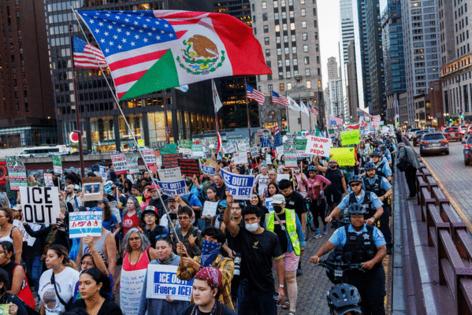ICE will continue enforcement amid shutdown, while other parts of the nation's immigration system may slow
Published in Political News
ICE will continue to conduct immigration arrests and detentions during the government shutdown.
Other aspects of the nation’s immigration system may slow, depending on the particular agency or duty.
The Trump administration has made Immigration and Customs Enforcement operations a top priority, notes the American Immigration Council’s Aaron Reichlin-Melnick, pouring dollars and people into its effort to bolster agency activities. Most ICE work is deemed “essential” and will continue whether or not the rest of the federal government is operating.
“There is NO CHANGE to U.S. immigration laws or border enforcement,” ICE posted on social media on Wednesday, adding that “border security and enforcement efforts remain strict.”
U.S. Customs and Border Protection, which includes the Border Patrol, is also deemed essential and will not be impacted by the shutdown. The Border Patrol is responsible for securing land borders between ports of entry, and CBP officers handle duties at those ports.
A port of entry includes seaports as well as airports and land crossings, places where CBP inspects travelers and goods for legal entry into the U.S.
Immigration Court in Philadelphia is open. People with cases in other jurisdictions can check the status of those courts here, at the website of the Executive Office for Immigration Review. On Wednesday afternoon it appeared that all courts were open.
“The immigration system will be impacted significantly less than other federal agencies,” Reichlin-Melnick wrote for the Council. “Trump’s signature mass deportation efforts will proceed, perhaps taking even less of a hit than during previous shutdowns.”
The legal immigration system is operated by U.S. Citizenship and Immigration Services, which is expected to remain open. USCIS is funded by the filing fees it receives from applicants ― not by Congress.
However, some agency functions could be slowed by the closure of other departments, like Labor, that provide USCIS with verifications.
And E-Verify, the system that tells employers whether someone can legally work in the U.S., is not funded by fees but by Congress. It’s unclear if alternate verification methods may be allowed during the shutdown.
©2025 The Philadelphia Inquirer, LLC. Visit at inquirer.com. Distributed by Tribune Content Agency, LLC.
























































Comments